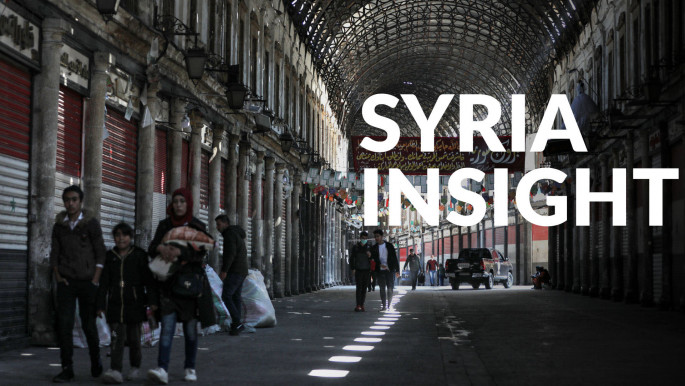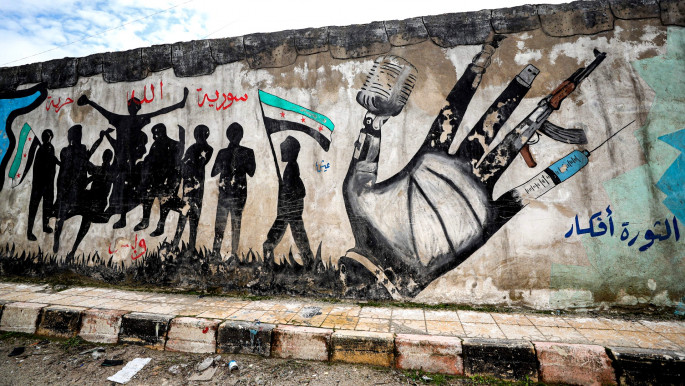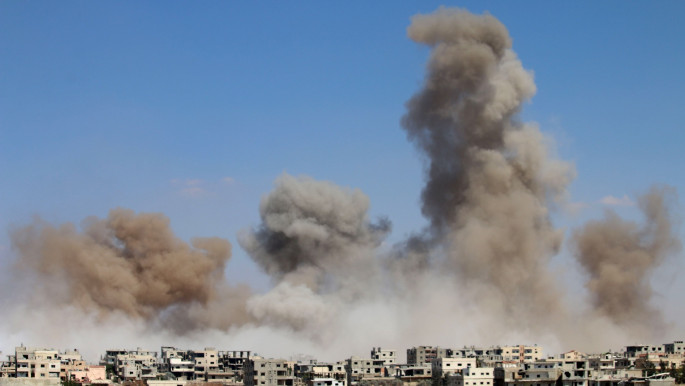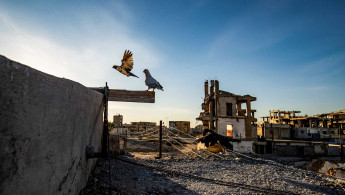Rebuilding Raqqa: Hope amid the ruins of war
Just a few years ago, the same square was the site of the Islamic State's (IS) gruesome executions. Now freed from the brutal extremist militant group, the former IS capital in Syria is trying to rebuild itself, but there are serious challenges ahead.
"The problem today is having enough money to buy food," Nala snaps, counting the money for her fruit juice. At her side, her friend nods silently. "Of course, we are happy that our homes weren't entirely destroyed and we are still able to live inside. But my four children are all in Lebanon, and I can't afford to go and see them," she says.
Syria is currently experiencing one of its worst economic crises in recent history, with the pound plunging in early March to its lowest in years - almost 4,000 to the dollar.
This economic disaster has deeply impacted areas under the control of Bashar al-Assad's regime and the autonomous administration of Northeast Syria (Rojava), where Raqqa is located. For a city struggling to recover from war, it's one of many obstacles to reconstruction.
Funding is not the only problem
When the Syrian Democratic Forces (SDF) liberated Raqqa in October 2017 over 80 percent of it was destroyed, as tens of thousands of air strikes pounded the city during the war against the Islamic State. Since then, municipal authorities (a coalition of Arabs and Kurds), have tried to manage the few subsidies they receive from the international coalition. But it's not just the money that's missing.
 |
Now freed from the Islamic State's brutal rule, Raqqa is trying to rebuild itself - but there are serious challenges ahead |  |
"Most educated and skilled people, engineers and those with experience, all of them have emigrated and have stable lives," Ahmad El Khader, the Deputy Mayor of Raqqa, also in charge of reconstruction, told The New Arab. Each day, his office is crowded by dozens of residents who have come to ask for help.
 |
|
| Read more: Bread queues and hunger in Assad's Syria |
"There are also legal difficulties, because we cannot move the debris if the owners of the houses are not there. They might have documents or personal belongings in it," he says, in-between signing and stamping papers. "We are trying to draft a new law, which would allow us to do this when the owner cannot go there because he has emigrated far away".
Moreover, the Islamic State had dotted the city with mines and IEDs, and despite the efforts of the clearance teams, several areas remain inaccessible.
"Thirty percent of the debris is still there," Ahmad says, "and this constitutes a sanitary risk too. So far, we took out at least 6,000 dead bodies and we discovered around 30 mass graves. But who can say how many might still be there? The risk of epidemics and diseases remains".
Nevertheless, he adds, "the inhabitants are very attached to their city and prefer to come back to live here in Raqqa, even in these conditions". Many residents have decided to return to live in their old homes, but there are risks. Thousands of buildings remain uninhabitable due to unsanitary conditions or mines, while health services are limited and the security situation is unstable.
 |
Before, under IS, everything was forbidden. In the conditions we used to live in, we were going mad, we felt like monsters, not humans |  |
When Raqqa resident Zacharia returned after liberation, his house had been razed to the ground. All he could do was pile the rubble to the side of his olive grove and set up a tent to house his wife and their seven children. "Those who can, rebuild. Others will do like me and have this life, and you see how it is," he says, shaking his head in despair. "If you want to rent a house, you will be asked for 100,000 Syrian pounds per month, or 150,000. It's the equivalent of seven months of salary. So where can I find this money? No one in Raqqa can find this money".
'Now we can talk and sing again, we feel like humans'
Daily life in Raqqa is not only difficult for those who have returned. For those who stayed in the city, power cuts are frequent and access to drinking water is rare. Sitting in front of her home, immersed in the warm sun of early spring, Rosa Zeya Marisa patiently waits for electricity to return to the neighborhood. The 60-year-old Syrian Christian resident remained in her home, with her husband, for the entire duration of IS' rule and then the war.
 |
|
| Read more: In the shadows of Syria's revolution, a generation of activists is born |
The married couple only left Raqqa for two weeks during the liberation, when the SDF evacuated the entire city to facilitate military operations. "We rebuilt just enough to be able to live in here without risking our lives," she told The New Arab. "We depend on God. What can we do?" she asks. "Who can we ask for money from? My husband is old, poor man, he doesn't earn enough".
Rosa suddenly interrupts the conversation to welcome her neighbor, Asma. The two women begin to gossip and soon their daily difficulties are swept away by laughter. In Raqqa, everyone is trying to rebuild themselves in the best way they can. Not far away, a group of musicians rehearses Syrian songs and dances. Mahmood al-Asyah, 46, is a musician and singer. "Now there is a lot of nightlife and cultural activities, life has picked up here in Raqqa," he explains.
 |
We know there are IS sleeper cells all around, and we are also aware that they are just waiting for a loophole to re-enter. But we see that more and more people are coming back to live here, and that's a promising sign |  |
"Before, under IS, everything was forbidden. So now everything tastes different, even the water we drink. The words don't sound the same, the song isn't the same song, our state of mind isn't the same. In the conditions we used to live in, we were going mad, we felt like monsters, not humans. Thank you, my God, the situation is improving now".
 |
|
| The cradle of Syria's revolution: Daraa ten years on |
Despite challenges, security is improving
Despite the resilience of Raqqa's people, widespread challenges remain, not least due to the presence of IS sleeper cells. Additional security forces are deployed throughout the city, but the militant group is far from extinct.
"In terms of internal security in the city, I can say that the situation is good inside Raqqa," a general in the city's security service told The New Arab. "We have cameras everywhere, at every crossroads in town. At nightfall you will also see checkpoints there," he said.
In the suburbs and rural areas on the outskirts of Raqqa, however, it is a different story. "We know there are IS sleeper cells all around, and we are also aware that they are just waiting for a loophole to re-enter," admits the general. "But we see that more and more people are coming back to live here, and that's a promising sign".
Sofia Nitti is an Italian video journalist based in Baghdad, Iraq
Follow her on Twitter: @SofiaNitti



